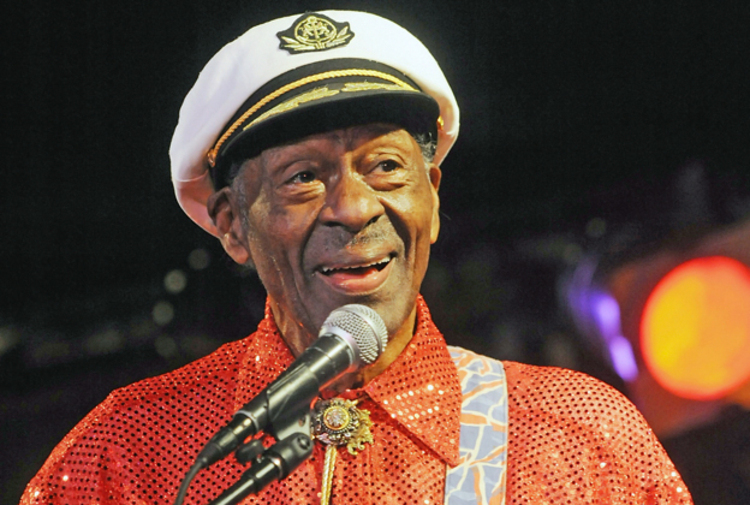Thank heaven for Chuck Berry’s feel-good music

David Mungoshi Shelling the Nuts
I AM impartial to music across the genres, I find succour, refuge, inspiration and drive in it. There are times when I can’t write unless there is music in the background. Just in case you are wondering where I am going, let me explain. Reports indicate the passing on of a musical torch bearer, the inimitably creative and gifted Mr Chuck Berry of Johnny B Goode fame. Chuck Berry has died at 90.
He was contemplating a studio album that would have been his first in 40 years. He is a big black man that must be celebrated. That’s something that does not happen too often.
Black achievements are generally overlooked despite the fact that the world is indebted to us in many ways.
People tend to mourn only those they know personally.
This is a regrettable thing to happen given that the fate of humanity is the same everywhere: life and death.
Today’s mass media penetration has dulled people’s senses to things of import.
Everywhere and everyday electronic and print media report on sickness and death, natural calamities and man-made wars as if they are normal and expected.
When someone passes on somewhere and we do not know them they become just another item on the day’s news.
We glimpse in passing only devastating things like the recent landslide in Addis Ababa and hardly ever stop to think about what might have been done to pre-empt it.
If only we were capable of learning from our collective experiences, things like the collapse of TB Joshua’s contraption that left many dead in its wake could be avoided.
To understand our common heritage as human beings, let us take time to consider the meaning and relevance of the content, tone and message of the poem ‘For Whom the Bell Tolls’ by John Donne, the gifted metaphysical poet.
He wrote thought-provoking poems that were meant to be evangelistic and that people could meditate on. There is no denying that there is a very close sense of identity between poetry and music.
This is why, for example, we speak of lyrical poetry, that poetry whose sound and rhythm is like that of music.
Spoken word poets and dance hall poets are, therefore poets, in the true sense of the word. In their craft, they mine the rich veins of music and make the beat supreme.
The beat then hosts the chants/raps whose rhymes can be quite clever and endearing. ‘For Whom the Bell Tolls’ illustrates the interdependence of the peoples of the world at work and in art.
Donne writes:
No man is an island,
Entire of itself,
Every man is a piece of the continent,
A part of the main.
If a clod be washed away by the sea,
Europe is the less.
As well as if a promontory were.
As well as if a manor of thy friend’s
Or of thine own were:
Any man’s death diminishes me, Because I am involved in mankind . . .
So how is Chuck Berry a piece of the continent and how is he involved in mankind?
In one valedictory message I have seen Chuck Berry is described as being among the earliest musical innovators who created a new big sound for the teenagers of the world.
His music was about cars, girls and wild dances and led in defining the texture of what later became rock and roll music: an a la carte menu of music genres and styles.
The words of Chuck Berry’s music were attractive, memorable and even incisive at times. He more than anyone else in the beginning defined the attitude of rock music and what it ought to be.
In the song ‘Rock and Roll Music’ he sings:
Just let me hear some of that
Rock and roll music,
Any old way you choose it;
It’s got a back beat, you can’t lose it,
Any old time you use it
It’s gotta be rock and roll music,
If you want to dance with me,
If you want to dance with me
I’ve had no kick against modern jazz,
Unless they try to play it too darn fast;
And change the beauty of the melody,
Until they sound just like a symphony . . .
In the two verses above Chuck Berry gave the world a template of what rock music was to be and also willy-nilly explained its difference with other music types.
The introductory riffs of his lyrical guitar made his songs start with a bang and become irresistible.
As the song progressed his guitar was skilfully woven against a rocking piano and a bouncy tenor saxophone. The combination created a big new bouncy feel-good music that youngsters could dance to. In ‘Roll Over Beethoven’ he apologises to Ludwig van Beethoven, the most celebrated composer of classical music, and to Tchaikovsky, for thrusting them aside with his new dance music. Some verses in this song are actually a rock and roll dance choreography. He says:
You know she wiggles like a glow worm
Dance like a spinnin’ top
She got a crazy partner
Oughta see ‘em reel and rock
Long as she got a dime the music will never stop
In the age of the juke box such dance moves as Chuck Berry describes were common and if you couldn’t dance then you were a ‘square’ in other words ‘wakasara’ (you were old fashioned and not much fun).
Chuck Berry’s musical diction in songs like ‘Thirty Days, Sweet Little Sixteen and Nadine’ clearly are the forerunners to vintage Bob Dylan.
Most people today attribute globalisation to information communication technologies (ICTs) particularly as configured in the Internet, Facebook, Twitter, WhatsApp and so on, but I beg to differ.
I think the revolution was set in motion much earlier by creative industry people like Chuck Berry with his infectious enthusiasm and inimitable genius that set the stage for latter-day sensations in the mould of James Brown, Jimi Hendrix, Michael Jackson, Prince, David Bowie and others ‘too many to mention’ as Albert Nyathi would say.
Rock and Roll music in all its subsequent shades set the world alight and tore the script apart in that one could dance to rock music anywhere in the world without necessarily understanding what the song was saying.
The melody and the beat became the common language that bound all enthusiasts together across the globe. That is what made world tours by musical groups not only possible but lucrative as well.
And whether or not the world acknowledges it, essentially we owe the musical cohesion and the various music orientation movements across the decades in the twentieth century to date to a black man called Chuck Berry.
I defy Donald Trump to deny this, and indeed anyone else. So, our dearly departed genius and entertainer par excellence, Mr Chuck Berry, we declare you here and now a lasting piece of intangible heritage.
There might be some among us who might be thinking that today’s instalment has no relevance for them and for Zimbabwe. If you’re one of them, well, I want to assure you that you are wrong.
We had popular rock and rollers here, and it doesn’t matter that they were doing Elvis Presley covers or those of Jerry Lee Lewis. They were an innovative lot that made life in the townships (today’s high density suburbs) interesting and connected. The likes of Harry Gwaze singing the Presley hit ‘Mean Woman Blues or King Creole’ and so on. I remember that lanky flashy rocker who called himself Wixie Memphis.
His favourite piece was ‘Like a Tiger’ by Fabian Fabulous.
I must say that he was quite suave, what lots of the kids these days are calling ‘swag’.
One day he was the MC at a Reggie Msomi show at a school in Bulawayo.
Reggie Msomi was a popular saxophonist from South Africa who at one time was part of the music circle of the kwela music king Spokes Mashiyane together with Lemmy Special Mabaso (Mabaso still plays the sax for The Soul Brothers).
Wixie pretended that Msomi had brought him a letter from his mother in South Africa and said he wanted to share the letter with us.
The letter said, “Dear Son, I am writing this letter to you very slowly because I know you can’t read fast.” I have never forgotten that and it made Wixie’s pedigree rise in my estimation.
Later, of course we had Manu Kambani of Dr Footswitch fame.
He could play his guitar like Jimi Hendrix. Bands like ‘Wells Fargo’ and ‘Eye of Liberty’ from Bulawayo sprouted in competition to the likes of Dr. Footswitch as did Baked Beans in Harare.
And this kind of music can be traced all the way back to Chuck Berry. Rest in Peace maestro, your passing on diminishes the world.
David Mungoshi is an applied linguist, poet and short story writer as well as an award–winning novelist.









Comments